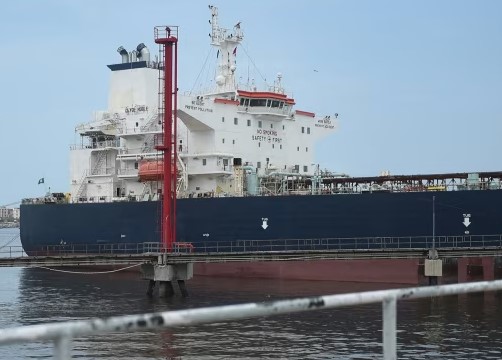Recent trends show that the discount on Russian oil is narrowing, and exports are increasing, despite the efforts of several nations to limit its sales. This situation is notable because the Group of Seven (G-7) countries, along with the European Union (EU) and Australia, have implemented a price cap on Russian oil. This cap is part of broader sanctions aimed at reducing Russia’s revenue from oil exports, especially in response to its actions in Ukraine. The rise of the Dark Fleet, which consists of tankers transporting Russian oil while evading sanctions, has contributed to this situation by finding new routes and buyers for Russian crude.
However, current data suggests that these measures may not be having the intended impact. A significant factor in this scenario is the emergence of the Dark Fleet—a network of tankers that transport Russian oil while circumventing international sanctions, enabling Russia to continue its oil exports to markets like India and China, thereby further complicating the effectiveness of the sanctions imposed.
The Changing Landscape of Russian Oil Pricing
According to recent reports, Russian crude prices have averaged only six cents below the price of Brent crude oil in the last month. This is a significant change from earlier this year when the price cap was first introduced. Around 30% less was being paid for Russian oil at the time. Just a year ago, that discount stood at approximately 16%. The shrinking gap in pricing indicates that Russian oil is becoming increasingly competitive in the global market.
The price cap limits the use of Western maritime services, such as insurance and transportation, for Russian oil priced above $60 per barrel. This is intended to restrict the ability of Russia to export oil profitably. Despite these restrictions, Russian oil is still finding its way to markets, particularly in countries like India and China, which have been increasing their imports of Russian crude. The ability of Russia to find new buyers is a significant factor in the narrowing discount.
Flag Switching: The Strategy Russian Oil Tankers Use to Bypass Sanctions
The Rise of the Dark Fleet
A key element of this situation is the emergence of what is known as the “dark fleet.” This term refers to tankers that transport Russian oil while avoiding detection and compliance with international sanctions. A recent report revealed that a record volume of Russian oil was carried by these sanctioned tankers in September, with 69% of all crude shipped that month being transported by ships categorized as belonging to the dark fleet. This represents the highest volume recorded since tracking began in mid-2022.
Chinese and Indian traders have been instrumental in this increase. They have been purchasing Russian oil despite the sanctions, and their demand has contributed to the growth of this shadowy fleet. The dark fleet includes tankers that are often older, anonymously owned, or structured in a way to conceal their ownership. Many of these vessels engage in deceptive practices, such as changing their flags and names to evade scrutiny.
Hossein Shamkhani and the Dark Fleet: A New Era of Sanctions Evasion in the Oil Market
An analysis by Lloyd’s List, an industry publication, highlighted the extent of this practice. The report stated that 5% of Russian oil transported in September was carried by tankers owned by the Russian government-controlled company Sovcomflot, which has been sanctioned by the EU and the UK. These tankers often switch their flags to countries like Barbados or re-register under different management to hide their identities.
The Implications of Sanction Evasion
The ongoing sanctions and price caps have led to a situation where some shipowners see significant profit in participating in the dark fleet. These shipowners are prepared to take the risk despite the possibility of U.S. and EU sanctions since Russian oil is still a profitable commodity, especially for refiners in China and India.
However, this situation raises several concerns. The increasing number of uninsured vessels carrying sanctioned oil is alarming. Reports indicate that in September, 201 of the 310 tankers tracked lacked insurance from the International Group of P&I Clubs, representing about 68% of these vessels. This figure indicates a growing trend of risk-taking in an already volatile market.
Teapot Refineries : Effective Chinese Tool in Sanction Evasion
The safety of maritime operations is another critical concern. The rise of the dark fleet has been linked to numerous accidents. Reports have shown that dark fleet tankers have been involved in more than 50 accidents, raising significant safety and environmental issues. If one of these vessels were to suffer an accident leading to an oil spill, it would be difficult to hold the owners accountable, as many of them are operating under anonymity. This would leave the cleanup and consequences to others, potentially causing extensive environmental damage.
The dynamics surrounding Russian oil exports are shifting, with a narrowing discount on prices and increasing reliance on shadowy shipping practices. The rise of the dark fleet and the continuing demand from nations like India and China have created a complex and challenging situation for those enforcing sanctions. Despite the efforts of various countries to limit Russia’s oil revenue, the global market remains influenced by these developments, posing both economic and environmental risks.


